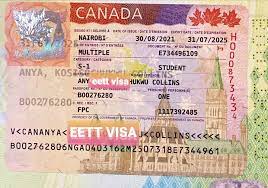Canada, renowned for its high-quality education and multicultural environment, attracts students worldwide. If you aspire to pursue education in Canada, understanding the process of obtaining a Canada student visa is crucial. This guide outlines the essential documents, application process, and frequently asked questions about the Canadian student visa.
What is a Canada student visa?

A Canada Student Visa, also known as a Study Permit, allows individuals to commence their studies at Designated Learning Institutions (DLIs) in Canada. It’s a combination of either a visitor visa or eTA and a study permit, enabling students to pursue educational programs in the country.
Conditions for Maintaining a Study Permit:
- Enrollment in a DLI is mandatory.
- Continuous progress towards completing the study program.
- Compliance with all student visa requirements.
- Ceasing studies if failing to meet visa conditions.
- Leaving Canada immediately upon study permit expiry.
Though a study permit doesn’t grant access to Canadian government benefits, it can facilitate a smoother path toward applying for Canadian citizenship.
Designated Learning Institution (DLI):
DLIs, approved by provincial or territorial governments, are educational establishments authorized to host international students. Primary and secondary schools in Canada are default DLIs, while not all universities or institutions hold DLI status. Ensuring enrollment in a DLI is crucial for study visa eligibility.
To verify an institution’s DLI status, visit the official Government of Canada website and select the province or territory to generate a list of DLIs.
Who needs a Canada study permit?
All international students requiring a visitor visa or eTA to enter Canada for studies must obtain a study permit. However, certain exceptions exist:
- A program duration of less than 6 months might not require a study permit, provided completion occurs within the stipulated period.
- Family or staff members of foreign representatives accredited by Global Affairs Canada might not need a study permit.
- Members of the foreign armed forces on official duties may not require a study permit, but family members might.
- Citizens of other countries with registered Indian status in Canada might not need a study permit.
- Minors in Canada who meet specific criteria might not need a study permit.
Eligibility for a Canada Student Visa:
To qualify for a Canadian Student Visa and Permit, meet the following criteria:
- A valid acceptance letter from a DLI detailing program specifics, tuition fees, and program duration.
- Primary student applicants must be at least 18 years old, while children under 18 can’t apply alone.
- A clean criminal history is substantiated by court documents.
- Completion and submission of the Visa Application Center (VAC) Consent Form.
- Submission of copies of current immigration status in another country or Canada.
- Demonstration of a temporary stay in Canada and a commitment to return home after studies.
Required Documents for a Canada Student Visa:
- Passport Scan: To verify its validity.
- Travel History: A scanned copy of your entire passport to display available blank pages and your travel history.
- Court and Police Letters: Certifying a clean criminal record from your country of residence.
- Declaration Letter: Addressed to the Government of Canada, explaining reasons for visa request and study permit needs.
- Photos: Two photographs adhering to Canada’s photo requirements.
- Medical Examination Documents: If required by authorities.
- Employment/Education Status Proof: Resumes, diplomas, or certificates.
- Proof of Financial Capability: Choose one among various options:
- Canadian bank account in your name.
- Guaranteed Investment Certificate (GIC) from a Canadian financial institution.
- Proof of a student loan.
- Bank statements (last 4 months).
- Receipts of paid tuition and housing fees.
- Letter of financial support or scholarship proof.
- Certificat d’acceptation du Quebec (CAQ): Mandatory for students studying in Quebec, issued by the Quebec government.
- Letter of Explanation: Stating reasons for studying in Canada and acknowledging student responsibilities.
- Custodian Declaration Form: If a minor requires a custodian other than a parent.
- Unique Client Identifier (UCI): Required for previous study permit holders.
- Family Members’ Application Forms: For spouse, common-law partner, or minor children accompanying the applicant.
All documents must be translated into English or French, accompanied by certified translations. Ensuring the authenticity and accuracy of translations is crucial.
Minimum Financial Requirements for a Canada Study Visa:
Financial prerequisites differ for students studying outside and inside Quebec. Students outside Quebec must prove their financial ability to cover tuition fees and living costs.
Application Process:
- Register Online: Create an account on the official immigration website to initiate the application.
- Prepare Documents: Gather and organize the necessary documents as per the guidelines provided.
- Fill out the application forms: Complete the visa application form accurately, and ensure all details are up-to-date.
- Pay the Visa Fee: Pay the required processing and biometric fees online through the designated portal. Retain copies of payment receipts.
- Submit Application: Scan and submit all documents through the online immigration account. Verify that all requirements are fulfilled before submission.
Alternate Ways to Apply for a Canada Student Visa:
1. Applying from Inside Canada:
Eligible categories include Ukrainian nationals, minors, exchange students, short-term course attendees, TRP holders, sponsored individuals, etc. The application process remains online.
2. Applying at the Port of Entry:
Only for specific nationals such as Ukrainians, US citizens, LPRs of the US, and residents of Greenland, Saint-Pierre, and Miquelon. Requires an Electronic Travel Authorization (eTA) and submission of documents at the Canadian Port of Entry for decision-making.
Can I apply for a student visa in person?
You can apply in person under specific circumstances, such as having a disability that hinders online applications or possessing particular travel documents.
What is the cost of a Canadian student visa?
Application fees include a study permit fee ($150) and a biometrics fee ($85 per person, $170 for families of 2 or more).
How long is the Canadian student visa valid?
Valid for the duration of the study program plus an additional 90 days for preparation or extension.
Does the Canada Student Visa allow you to visit your home country?
Allows travel abroad during breaks, but valid documents (visa/eTA and study permit) are mandatory for re-entry.
Can I Change Schools With a Canada Student Visa?
Must notify the Canadian Government when changing educational levels or certain institutions, requiring a new study permit.
Can my family members accompany me to Canada?
Spouses, common-law partners, and minor children can apply for visitor visas to accompany you during your studies.
Can I work while on a student visa?
Students may work on-campus, complete co-ops or internships required by their program, or work off-campus (up to 20 hours per week) if permitted by their study permit.
Can I work after I complete my studies?
After completing their studies, eligible students can apply for a Post-Graduate Work Permit (PGWP) based on their program’s length.
- Less than 8-month study program: not eligible for PGWP.
- 8-month to 2-year study program: PGWP for the same duration as the study program.
- Two or more-year study program: PGWP is valid for 3 years.
- I enrolled in and completed multiple study programs: Eligible for up to a 3-year PGWP.
Understanding these aspects can significantly enhance your experience and opportunities while studying in Canada. Always ensure compliance with Canadian immigration regulations for a smooth and successful stay.

